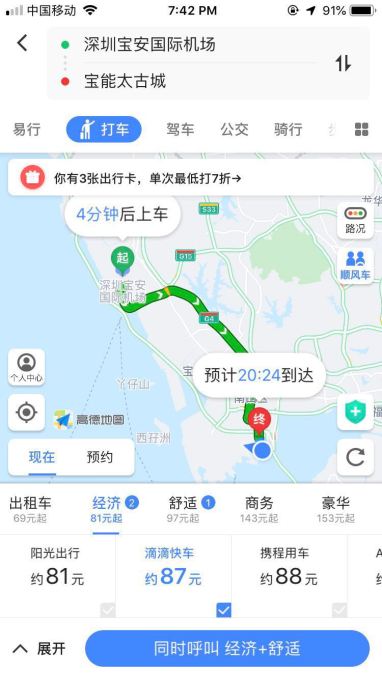Instead of switching between apps to secure a ride during rush hour, people in China can now hail from different companies using a single app. Some of the country’s largest internet companies — including ride-hailing giant Didi itself — are placing bets on this type of aggregation service.
The nascent model is reminiscent of a feature Google Maps added in early 2017 allowing users to hail Uber, Lyft, Gett and Hailo straight from its navigation app. A few months later, AutoNavi, a maps app owned by Alibaba, debuted a similar feature in China. Other big names like Baidu, Hellobike, Meituan and Didi subsequently joined forces with third-party ride-booking services rather than building their own.
The trend underscores changes in China’s massive ride-hailing industry of 330 million users (in Chinese). The government is tightening rules around vehicle and driver accreditation, leading to a widescale driver shortage. Meanwhile, established carmakers including BMW and state-owned Shouqi are entering the fray, offering premium rides with better-trained fleet drivers, but they face an uphill battle with Didi, which gobbled up Uber China in 2016.
By corraling various ride-booking services, an aggregator can shorten wait time for users. For new ride-hailing players, riding on a billion-user platform like Meituan opens up wider user acquisition channels.
These ride-hailing marketplaces let users request rides from any number of third-party services available. At the end of the trip, users pay directly through the aggregator, which normally takes a commission of about 10%, although none of the players have disclosed how revenue is exactly divided with their mobility partners.
In comparison, a ride-hailing operator such as Didi charges about 20% from each trip since they take care of driver management, customer support and other dirty work which, to a great extent, helps build the moat around their business.
Here’s a look at who the aggregators are.
Alibaba: When AutoNavi, the maps app that delisted from Nasdaq after Alibaba agreed to buy it for $1.5 billion, entered ride-hailing in 2017, Didi enjoyed a handsome 90% market share. AutoNavi’s mobility push wasn’t meant to take on Didi. In fact, Didi, also backed by Alibaba, is now one of the mobility partners on AutoNavi.
The number and choice of partners vary from city to city. Take Shenzhen, a fast-growing city known for its booming tech sector. AutoNavi ferries people around the city through eight ride-hailing partners.

Screenshot: People can request rides from a range of services directly from Alibaba’s AutoNavi maps app.
When contacted by TechCrunch, Alibaba declined to explain how AutoNavi’s driver system works. Say, when drivers from two different operators are within an equal distance from a user, who will AutoNavi send?
AutoNavi has maintained a quiet profile since its founding in 2002 and has said little about its young ride-hailing venture. It doesn’t disclose how many of its 100 million daily active users (in Chinese) have booked rides. Chinese business news blog Late News reported recently that the app had surpassed four million ride-hailing orders a day, although Alibaba declined to comment on the figure.
In a rare occasion when AutoNavi did speak up, it said it is “pleased to see more companies joining the [ride-hailing aggregation] space. Together we can serve the general public.”
Baidu: A few months after AutoNavi’s mobility launch, Baidu, China’s largest search engine provider, added ride-hailing aggregation to its maps app. In Shenzhen, it allows passengers to select from three services.
Hellobike: 2018 saw the entry of Hellobike, an up-and-coming mobility startup that enables bike and scooter sharing in addition to battery charging. Backed by Alibaba’s financial affiliate Ant Financial, Hellobike can trace much of its early user acquisition to its ties with Alipay, Ant’s electronic payment platform that allows people to use Hellobike without having to download the company’s app.
Like Baidu, Hellobike hasn’t aggressively grown its ride-hailing network and relies on two partners in Shenzhen.
Meituan: Backed by social networking giant Tencent, Meituan took a stab in transportation a year ago by launching a Didi-like service. Much as Uber and Didi have shown, ride-hailing is a cash-bleeding venture for the company. As Chinese regulators call for more accountability from operators, Didi and the like have poured big bucks into safety and customer service. No longer can they bill themselves as detached mediators between drivers and passengers.
With mounting costs, Meituan announced it was pausing ride-hailing expansion following its public listing in Hong Kong.
But the one-stop shop for local services still wants mobility to be part of its offerings. Besides food delivery, Meituan also powers in-store experiences such as reservations, paperless orders and group deals. Thus, capturing the transit departing from restaurants has always been in the cards.
This year, the company took a more asset-light approach and began offering third-party ride-hailing to a growing list of cities. In Shenzhen, the app dispatches drivers from four platforms.
A Meituan spokesperson told TechCrunch that the aggregation feature “will not involve spending heavy subsidies.”
“The ride-hailing market has reached a mature stage. If Meituan were to offer the service itself, it’s facing a very high barrier of entry in terms of driver and passenger subsidies as well as driver supply,” Sun Naiyue, a transportation analyst at market research firm Analysys, told TechCrunch. “What Meituan needs more is perhaps driving traffic to its existing businesses.”

Photo: Didi Chuxing
Didi: The market leader isn’t sitting still. The scale it has built up means it’s a more efficient marketplace given riders experience less wait time and drivers benefit from shorter pickup distance. Nonetheless, new industry rules have squeezed its driver supply. The company said it removed at least 300,000 illicit drivers over the past year.
While Didi still holds a leading position in ride-hailing, its share has shrunk to 80% of the market’s active user base, according to Sun. Its attempt in aggregation is not surprising, perhaps a bit urgent. In an earlier interview with TechCrunch, Didi said it welcomes the possibility of working with outside partners and that it hopes to “be more open and create win-win situations.”
In May, Didi announced it was opening up to third-party services, a move that could potentially fill its driver gap. It’s currently trialing the feature with one partner in Chengdu.
With that, Alibaba has established its ride-hailing presence to various degrees through three allies: AutoNavi, Hellobike and Didi.
TechCrunch reached out to Didi about its new feature but has not heard back. We will update the story when more information is available.
“Didi is launching aggregation and opening its platform to smaller services at a time when it needs to improve user experience by shortening their wait time,” said Sun. “It’s its defensive move.”
